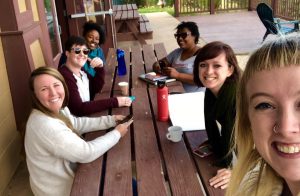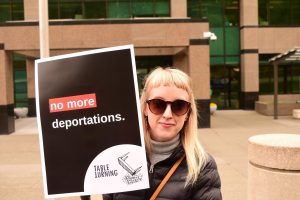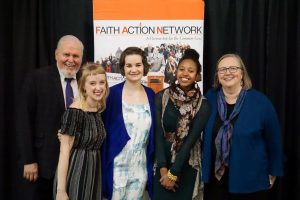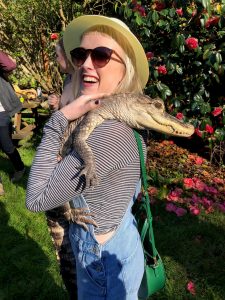The Word
Micah 6:8 – For what does the Lord require of you but to do justice, love kindness, and walk humbly with your God?
Down the River
As spring turns to summer, you decide to take a nice long walk outside. The sun is shining. You walk through the park, smell the blooming flowers, bask in the shade of the trees. You decide to walk over to the riverfront to cool off, and you notice something in the water flowing downstream. What could that be? You take a closer look and… is that a puppy? What the heck?! You jump in and grab the puppy as it floats downstream and you yell for help. Someone comes over and tends to the needs of the puppy, another pets it, and yet another feeds the puppy. Someone else looks for future care, housing, family. What a stressful moment! Thank God that’s over with.
Until…
Someone notices another puppy in the river. You pull the puppy out and repeat the pattern of care. And then another. And another. Soon, more and more puppies are floating downstream and the whole town has come to pull them out. They are caring for them as fast as they can. The patterns of care begins to get organized. Donations come in, rules regarding care get put in place, volunteers come from around the area to help.
As everyone busies themselves in the rescue efforts, a few townsfolk start to run away, up along the shore of the river. “Where are you going?” you shout, “We need everyone’s help to save these puppies!”
“We are going upstream to find out why this is happening and stop whoever is throwing them in.”
What does the Lord require of you?
This story is a way to begin to think about the differences between justice and charity. Charity is the meeting of immediate needs – rescuing and caring for the puppies floating down the river. Food banks, shelters, donations of clothing and assistance with other actions needed to maintain life in our communities. This is necessary work in the world we live in. With rampant systemic inequality, there are a lot of needs to be met and people to help. Justice is working to change the system. Finding out why these puppies are floating downstream in the first place. Looking at policies and legislation and systems in place that are creating these immense divides and inequities. How can we advocate for change to ensure that people’s rights are protected, and their needs are met – before they float downstream in the first place?
Many faith communities do amazing charity work, meeting immediate needs in their communities. Again, this is important and necessary. But what would it look like if more churches took up the fight for justice? If people of faith joined together as a collective voice for equity, for peace, for sustainability, for love? What if they used some of the resources, the connections, the stories, the relationships made from providing these direct services to inform their work in advocacy and justice?
Do Justice.
In July of 2018, I began the ELCA Hunger Advocacy Fellowship. This fellowship comes from a partnership between ELCA World Hunger, ELCA Advocacy, and statewide public policy offices across the United States. It’s a 12-month program that combines leadership development with impactful advocacy – working together to end hunger and poverty by engaging directly with local, state and national governments, and equipping people of faith to seek justice and equity. There are 6 of us around the United States this year! My placement for this fellowship has been at Faith Action Network, an interfaith advocacy nonprofit in Seattle that works in coalition with individuals and faith communities from a multitude of different faith traditions and backgrounds. We fight for justice, we advocate to and for our neighbors, and we walk together in solidarity.

ELCA World Hunger Fellows 2018-2019
Through this fellowship, I’ve learned about community organizing, creating connections, and leading meetings. A lot of our work culminated during the Washington state legislative session – I did outreach and research, watched committee hearings, analyzed and tracked legislation, and encouraged folks across the state to take action on important bills and legislation. I’ve attended rallies and marches, met with elected officials both in Washington state and congressional folks in Washington DC, and spoken at youth gatherings on the importance of advocacy. I’ve lead workshops and adult education hours on social change and how a bill becomes a law. I’ve gotten to see faith communities literally practicing what they preach – loving their neighbors by fighting for change. I’ve seen churches and people of faith have a voice in advocacy. I’ve gotten to see real change take place along the way.
Love Mercy, Walk Humbly.
This year has been a breath of fresh air. I have seen kindness and love pour from the hearts of so many people working to enact policies that’ll protect and bring life to those around them. Laws and policy can protect and preserve, ignore and neglect, empower and inspire, suppress and marginalize. Creating policy from a point of love and care can be the key difference between these dichotomies.

Sarah participating in public action with her Fellowship placement site.
Humility is often regarded as putting yourself below others, but I think humility can also be the simple understanding that no one can do this alone. There is much work to be done, and we must work together. This fellowship has been transformative in my understanding of justice, love, and humility. The church can be a powerful voice for change in our world, to help others. To humbly walk up the riverfront, working to change the systems that create inequalities. I hope you will take up this call to advocacy and justice as well. Together let us go to the river – a collective voice shouting for change.

Sarah with colleagues from her Fellowship site in Washington State
—
There are many placements for the fellowship this upcoming year! If you want to learn how to speak out for change, how to move people of faith to care for one another, to fight for policies and legislation that will make this planet a better (and/or livable) place to be, please apply here:
Reflection Questions:
- Where do you see charity or justice being done in your community? In your community of faith?
- What was a time you participated in / received each of these (charity and justice)?
- Sarah shared a passage that is meaningful to her, Micah 6:8. How do you understand God’s call to do justice, love mercy, and walk humbly in your own context?
- What are some other passages / quotes / texts / songs that inspire you to listen to / work alongside / care for your community?
- What are some specific gifts YOU bring to the world? How might you “humbly walk up the river” with those gifts to address the root causes of issues in your community?
- How do you hear the Spirit calling you into the community inside and outside the church today?

Sarah is the Hunger Advocacy Fellow at Faith Action Network this year. Growing up in the Seattle area, she has a deep love for the northwest, and continues to fight for legislation to improve her state for everyone in it. After four summers working at Flathead Lutheran Bible Camp in Montana, and a year in South Africa with Young Adults in Global Mission, this Fellowship has helped her discern her next step to begin law school in the fall! She’ll study public interest law at Gonzaga School of Law. Sarah’s passionate about intersectional feminism, comedy, playing the cello, the Good Place, Carly Rae Jepsen, strong coffee, hoppy IPAs, and sour candy.
